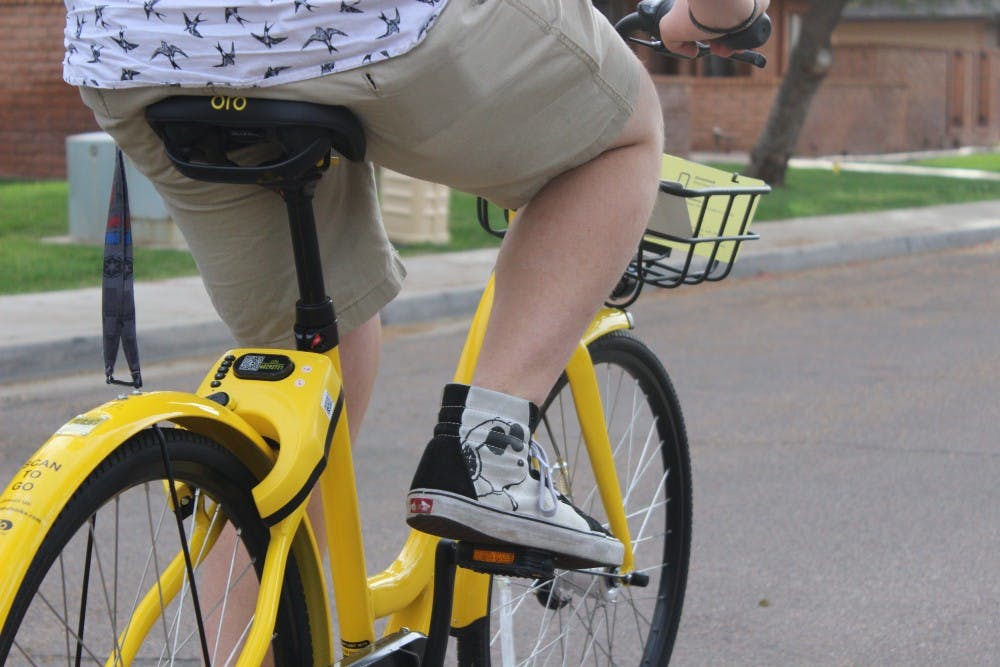Bent tires, broken frames, missing pedals — dockless shared bikes take a lot of abuse. This is a new service to Tempe, with three companies hoping to tap into the student market: Spin, LimeBike and ofo.
Students, many of whom often find themselves rushing to and from campus, will tell you the bikes are a godsend, especially when companies make limited offers for free rides. Long-time Tempe residents and automobile commuters, however, may be a bit less enthused.
Read more: Sharing the love: Bike-sharing is taking over campus
The city has received complaints from many residents about the bikes being littered about — often non-functional — in inconvenient places: the middle of sidewalks, on top of bus stops, in Tempe Town Lake and even right in the middle of the street.
TaiAnna Yee, a spokeswoman for the City of Tempe, said one-off forms of vandalism are the least of the city’s worries. Tempe has been more concerned by the frequent calls by residents, informing the city of a sidewalk or roadway obstruction.
"You’ll always have people who will abuse the system," she said, in reference to sightings of bikes submerged in the Rio Salado.
Other American cities have passed strict regulations to combat the downside of bike-sharing. San Francisco is notoriously tough on dockless bike-share companies, having opted instead to partner closely with docked bike-sharing services, such as Citi Bike and GoBike. The same can be said of New York City.
Tempe, however, has been very accommodating of dockless bike-sharing companies and recently even welcomed its first scooter-sharing service, Bird. But that attitude could only last for so long. As resident complaints have mounted, Tempe has started investigating what other cities in the U.S. have done to regulate dockless sharing services.
"Tempe is a smaller city than most of the other cities," Yee said. "You hear all of these large numbers like New York or Seattle. You have to think about the square miles of those cities compared to how small Tempe is. So we don’t want our city to have a thousand bikes all just hanging out on Mill Avenue."
Here Yee is talking about a cap, which is the maximum amount of bikes a service can have in the city at any one time. Caps are an effective form of regulation in terms of keeping the city uncluttered by thousands of unused bikes. But they tend to be unpopular with businesses because, even though a cap may be placed well above the current operational number of bikes, it does not account for usage growth.
In other words, if the service were to ever become more popular, a cap would be a limiting factor on the businesses because it would artificially restrain growth.
The cap approach has been taken by other U.S. cities, but Eric Smith, a spokesperson for ofo, said this is not what the company would like to see.
"We want cities to make sure they’re not regulating too quickly, but we understand there’s definitely a need," he said. "I don’t think anyone has figured out the right number in terms of caps to make this happen.”
Yee said the city is considering many different options and looking at many U.S. cities for a direction. It is unlikely that Tempe will take a strict approach, like those of San Francisco or New York City, to dockless bike-sharing. She said the city would like to see what par for the course is for all U.S. cities, especially the ones that are most similar to Tempe.
"We're not going to be charging them an arm and a leg, because we do want these companies to be operating in Tempe," Yee said. "We just have to come up with a way that works for us, works for the users and works for the companies."
Editor's note: A previous version of this story misquoted Eric Smith as saying the number of bikes in cities such as San Francisco and Santa Monica is capped at 250,000. Smith was in fact referring to $250,000 in licensing fees for businesses, not a cap on the number of bikes. The misquotation has been removed.
Reach the reporter at parker.shea@asu.edu or follow @laconicshamanic on Twitter.
Like The State Press on Facebook and follow @statepress on Twitter.




